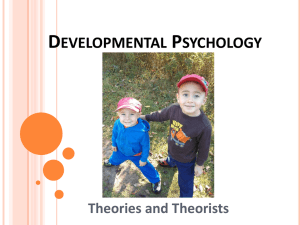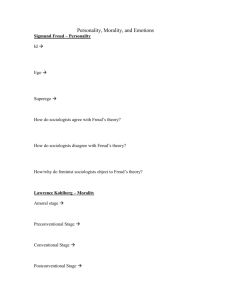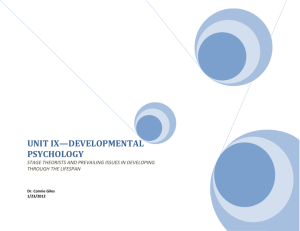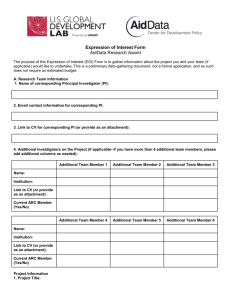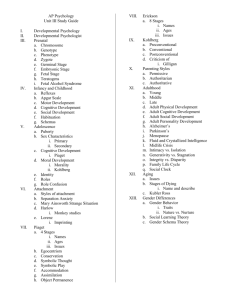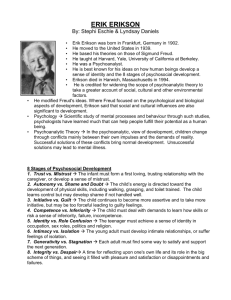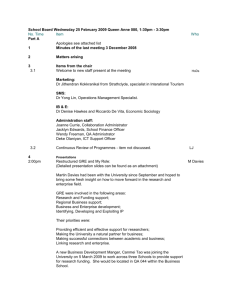Developmental Psychology
advertisement
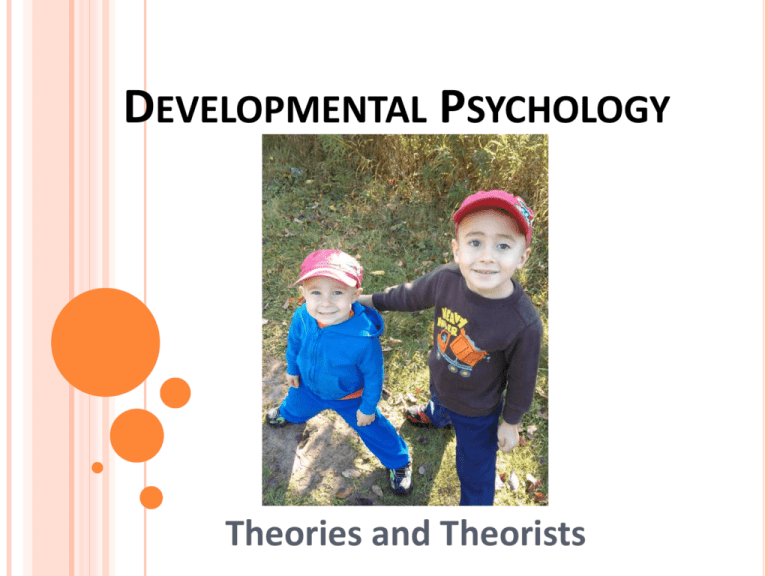
DEVELOPMENTAL PSYCHOLOGY Theories and Theorists SOCIAL DEVELOPMENT Up until about a year, infants do not mind strange people (maybe because everyone is strange to them). At about 6mths – 1yr, infants develop stranger anxiety. STRANGER ANXIETY is the fear of strangers. Infants form schemas for familiar faces and cannot assimilate a new face. ATTACHMENT Placed in a strange situation, 70% show secure attachment. They explore their environment happily in the presence of their mothers but distressed when mom leaves. The other 30% show insecure attachment. These children cling to their mothers or caregivers and are less likely to explore the environment. ORIGINS OF ATTACHMENT Harry showed that monkeys needed touch to form attachment. Harlow (1971) showed that infants bond with surrogate mothers because of bodily contact and not because of nourishment. Those who are deprived of touch have trouble forming attachment when they are older. TYPES OF ATTACHMENT Mary Ainsworth’s Strange Situation. Three types of attachment: • Secure • Anxious / Avoidant • Anxious / Resistant PARENTING STYLES – (BAUMRIND) Description Authoritarian Parents Permissive Parents Authoritative Parents Parents impose rules and expect obedience. Parents submit to children’s demands. Parents are demanding but responsive to their children. SIGMUND FREUD We all have a libido (sexual drive). Our libido travels to different areas of our body throughout our development. If we become preoccupied with any one area, Freud said we have become fixated on it. Together Freud called these stages our Psychosexual Stages of Development. ORAL STAGE (0-18THS) Babies seek pleasure through out mouths. Fixated people overeat, smoke or have a childhood dependence on things. ANAL STAGE (18MTHS - 3) Develops during toilet training Libido is focused on controlling waste and expelling waste A person fixated may become overly controlling (retentive) or out of control (expulsive) PHALLIC STAGE (3-7) Children 1st recognize gender Causes conflict in families with the Oedipus and Electra Complexes Fixation can cause later problems in relationships LATENCY STAGE (7-11) Libido is hidden Cooties stage Freud believed that fixation in this stage could lead to sexual issues GENITAL STAGE (12 - RIP) Libido is focused on their genitals Freud thought fixation in this stage is normal ERIK ERIKSON—SOCIAL DEVELOPMENT A neo-Freudian Personality is influenced by our experiences with others Created Stages of Psychosocial Development where each stage centers on a social conflict TRUST V. MISTRUST (0-1) The trust or mistrust they develop can carry on with the child for the rest of their lives AUTONOMY V. SHAME & DOUBT (1-3) All about control Control bodies (toilet training) Control people (temper tantrums, saying NO) They either learn control or will they doubt themselves INITIATIVE V. GUILT (3-6) Favourite question - WHY? Want to understand the world and ask questions Curiosity is encouraged or scolded INDUSTRY V. INFERIORITY (6-12) Start School – evaluated by school and peers Feeling good and bad about accomplishments Can lead to inferiority complex IDENTITY V. ROLE CONFUSION (12-19) Teenage years – try different roles Ask - Who am I? What group do I fit in? May develop an identity crisis INTIMACY V. ISOLATION (20-25) Balance work and relationships. Must prioritize Struggle to form close relationships and gain capacity for intimate love…or, feel isolation GENERATIVITY V. STAGNATION (26-64) Re-evaluating goals / purpose / happiness Mid – life crisis INTEGRITY V. DESPAIR (65- ?) Reflect on life Contemplate meaningfulness, Successes, failures, regrets Stage age Experience + Experience - Trust v. Mistrust B-1 Parent care: physical /psychological needs Lack of care uncertain parental love Autonomy v. shame, doubt 2 yrs Encouragement, clear discipline Criticism, overprotective discipline Initiative v. guilt 3-5 Encouragement of child’s interests, parental pride Criticism of child’s failures Industry v. inferiority 6-12 Guidance and praise of Too high/low expectations academic/social development to success in school Identity v. diffusion Adol. Strong role models to promote self-esteem and life goals no role models, social demands cause inner turmoil Healthy identity – concern for others – caring relationships Focus on the self over others fear of being hurt by bad rel. Intimacy v. isolation Young adult Generativity v. isolation. Adult - Make good personal hood decisions, success, enjoy work, concern for growth others Self-centered, lack of concern for others Integrity v. dispair Old age Depression, lacking fulfillment, sense of failure Self-confident, having led a complete life - satisfaction Erikson's psychosocial crisis stages (syntonic v dystonic) Freudian psychosexual stages life stage / relationships / issues 1. Trust v Mistrust Oral infant / mother / feeding and being comforted, Hope and Drive teething, sleeping Sensory Distortion / Withdrawal toddler / parents / bodily functions, toilet training, muscular control, walking Willpower and Self-Control Impulsivity / Compulsion preschool / family / exploration and discovery, adventure and play schoolchild / school, teachers, friends, neighbourhood /achievement and accomplishment Purpose and Ruthlessness / Inhibition Direction Competence and Narrow Virtuosity / Inertia Method 2. Autonomy v Anal Shame & Doubt 3. Initiative v Phallic Guilt 4. Industry v Latency Inferiority 5. Identity v Puberty adolescent / peers, groups, Role Confusion and influences / resolving identity and direction, Genitality becoming a grown-up 6. Intimacy v Isolation basic virtue and maladaptation second named / malignancy(potential strength (potentia negative outcome - one or the l positive other - from unhelpful outcomes from experience during each crisis) each crisis) Fidelity and Devotion (Genitality) young adult / lovers, friends, work Love and connections / intimate relationships, work and Affiliation social life Fanaticism / Repudiation Promiscuity / Exclusivity 7. Generativity v Stagnation n/a mid-adult / children, community / 'giving back', Care and helping, contributing Production Overextension / Rejectivity 8. Integrity v Despair n/a late adult / society, the world, life / meaning and purpose, life achievements Presumption / Disdain Wisdom and Renunciation JEAN PIAGET – COGNITIVE DEVELOPMENT Cognitive development - information processing, concepts, and perceptual skill. The construction of thought processes (remembering, problem solving, and decision-making), from childhood through adolescence to adulthood 4 Stages / Levels IMPORTANT TERMS FIRST!!! Schema – Ways we interpret the world around us (picture in our heads) Assimilation – incorporating new experiences into existing schemas. Eg, meeting someone new Accomodation – Changing an existing schema to adopt new info. Eg, Campion SENSORIMOTOR STAGE (0-2) Experience world through senses Developing object permanence Understands some symbols and language PRE-OPERATIONAL STAGE (2-6) Develops language, symbol use, memory and imagination Nonlogical thinking Ego-centric Does not understand conservation CONSERVATION CONSERVATION CONSERVATION TYPES OF CONSERVATION TASKS CONCRETE OPERATIONAL STAGE (7-11) Develops logic Understands symbol use Demonstrates conservation FORMAL OPERATIONAL STAGE (12- ADULT) Develops abstract reasoning Hypothesis testing Trial and error Metacognition Not all adults reach this stage KOHLBERG & GILLIGAN – MORAL DEVELOPMENT Moral development - the process through which children develop proper attitudes and behaviours toward other people in society, based on social and cultural norms, rules, and laws. Kohlberg Gilligan Heinz Steals the Drug In Europe, a woman was near death from a special kind of cancer. There was one drug that the doctors thought might save her. It was a form of radium that a druggist in the same town had recently discovered. The drug was expensive to make, but the druggist was charging ten times what the drug cost him to make. He paid $200 for the radium and charged $2,000 for a small dose of the drug. The sick woman's husband, Heinz, went to everyone he knew to borrow the money, but he could only get together about $ 1,000 which is half of what it cost. He told the druggist that his wife was dying and asked him to sell it cheaper or let him pay later. But the druggist said: "No, I discovered the drug and I'm going to make money from it." So Heinz got desperate and broke into the man's store to steal the drug-for his wife. Should the husband have done that? (Kohlberg, 1963, p. 19) LEVEL STAGES 1. Pre-Conventional 1.Follow rules to avoid punishment Decisions based on rewards 2.Follow rules for personal and punishments benefit 2. Conventional 3.Do good because it is expected of you by others Desire to please others 4. Follow rules because society expects you to follow standards. 3. Post-Conventional 5. Follow rules for benefit of all Belief in morality because it’s 6.Follow rules because of the right thing to do conscience CRITICISMS OF KOHLBERG Carol Gilligan pointed out that Kohlberg only tested boys. Boys tend to have more absolute value of morality. Girls tend top look at situational factors.
